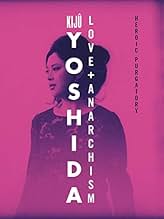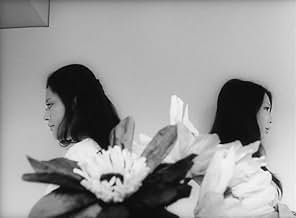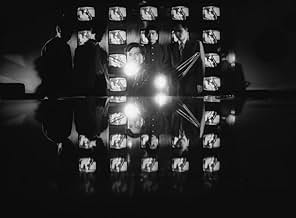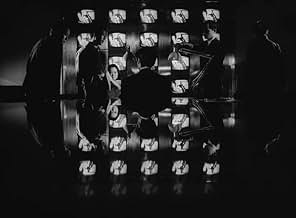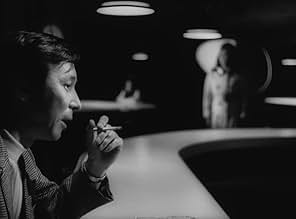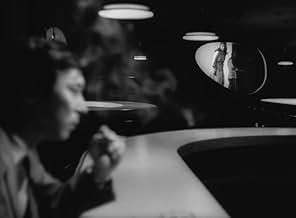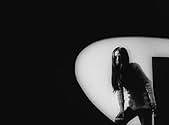An engineer's wife returns home with a lost teenager. A man posing as her dad tries to get her back, causing the engineer to recall his youth as a revolutionary, obscured by dreamlike disrup... Read allAn engineer's wife returns home with a lost teenager. A man posing as her dad tries to get her back, causing the engineer to recall his youth as a revolutionary, obscured by dreamlike disruptions of time and space, fantasy and reality.An engineer's wife returns home with a lost teenager. A man posing as her dad tries to get her back, causing the engineer to recall his youth as a revolutionary, obscured by dreamlike disruptions of time and space, fantasy and reality.
- Director
- Writer
- All cast & crew
- Production, box office & more at IMDbPro
Featured reviews
An engineer's wife returns home with a lost teenager. A man posing as her dad tries to get her back, causing the engineer to recall his youth as a revolutionary, obscured by dreamlike disruptions of time and space, fantasy and reality.
Although I did not care for "Eros" the way some people do, I actually liked this one a bit more. Yes, the picture is washed out and I wish it was not. But the clever angles and framing made me enjoy the film from the opening shots. It has a very science fiction feeling to it at times, and I wish it had more of that.
As part of the "radicalism trilogy", I would say this is my favorite of the three. I am not crazy about Yoshishige Yoshida, but this film at least struck a bit of a cord with me.
Although I did not care for "Eros" the way some people do, I actually liked this one a bit more. Yes, the picture is washed out and I wish it was not. But the clever angles and framing made me enjoy the film from the opening shots. It has a very science fiction feeling to it at times, and I wish it had more of that.
As part of the "radicalism trilogy", I would say this is my favorite of the three. I am not crazy about Yoshishige Yoshida, but this film at least struck a bit of a cord with me.
'Heroic Purgatory' has suffered most of from the obscurity into which Yoshida's trilogy of radicalism has been cast. At least an hour shorter than its predecessor, 'Eros Plus Massacre', it takes that film's tendency to narrative compression and ellipses to an extreme, and a first viewing may render elements virtually incomprehensible, as Yoshida's characteristically bleached-out, askew framing renders public, exterior space a bleached-out, ghostly horizon, glimpsed in the distance as if in perpetual mist or blinding sunlight, and domestic, and interior space an endless series of corridors or bedrooms, of secret spaces, in which characters endlessly circle the space and each other.
The film opens as Nanako (Mariko Okada) witnesses what appears to be the attempted suicide of a young woman, Ayu (Kazumi Tsutsui), who then follows her to the apartment she shares with her husband, engineer Rikiya (Kaizo Kamoda), the three becoming a kind of strange family unit of 'adopted' children, absent parents and power triangulations. (It's never made clear in Ayu in fact exists or is a kind of mutual projection of the childless couple). Ayu, who, at least initially, speaks only rarely, claims to be 'lost' and disowns the 'father' who comes to the couple's flat to claim her, and who may or may not be either a police spy, a member of the revolutionary cell in which Rikiya was formerly involved, or a genuine father who has lost both his wife and daughter. As the film unfolds, Rikiya recalls his past within that cell during the signing of the 1952 San Francisco treaty--a de facto ceding of colonial power to the occupying American forces, beyond the period of ostensible occupation--as a planned attempt to either kidnap or assassinate an ambassador collapses due to the possible intervention of a spy within the group. This moment is played out again and again, shifting in time and location from 1952 to 1960 (the signing of another treaty of compromise), 1970 (when the film was made) and 1980, ten years in the future: actors play multiple roles, as the original members of the 1952 cell appear to take up roles in 'official society' and their successors among the new waves of radical movements turn against them.
'Eros' memorably presented three alternate versions of the attempted murder that forms the film's climax. Here, virtually every incident appears to be replayed in numerous ways: most notably, the act of potential betrayal and the subsequent trial and possible execution of the supposed 'spy'. A puzzle film like 'Out 1' or 'Inland Empire', 'Heroic Purgatory' is nonetheless more a political than a philosophical reflection. The film ends at the train station at which much of the action has taken place, as Nanako and her 'daughter' board an empty train, only to exit once more and walk back along the platform in front of a sign which reads 'dead end'. They exchange brief dialogue. 'It's over. Nothing left'. 'There's still things to do.' 'Depart to a distant place?' 'I will get rid of what I thought my God was'. As the two women walk towards the camera (back to the city, back to society), the camera focuses on the 'Dead End' sign, previously only a blurred smudge of white in the background, before blurring it out once more. It's a perfect in-joke: the traditional signing off of a film, the boundary re-established between life and cinema, the mechanism of narrative closure that rounds off in a neat summary, with the English language signage reflecting the enforced dominance of American culture and its representational strategies. The Dead End would also seem to refer to the attempt to change society through underground political action, in which, for Yoshida, the same mistakes repeat: the hierarchy, repetition of trauma and, in particular, the patriarchal violence and sadism--which at once condemns sexuality as counter-revolutionary distraction and sublimate it into gendered cruelty. The inability to break a cycle of various kinds of repetition, even in the most radical, vanguard, progressive or advanced of movements--whether official technocracies or revolutionary organisations--is the film's purgatorial territory. It's perfectly possible to view the as presenting a jaded perspective of liberal cynicism. Yet such a view more easily, more comfortably, more cynically fits into narratives of power, defeat and resistance than the film itself offers. Struggles for power may repeat themselves, first as tragedy, then as farce: yet this also means that resistance never ends. Viewed half a century on, Yoshida's projections of the present into both past and future suggest that, for all the moments of suppression, the revolution will continue to be fought.
The film opens as Nanako (Mariko Okada) witnesses what appears to be the attempted suicide of a young woman, Ayu (Kazumi Tsutsui), who then follows her to the apartment she shares with her husband, engineer Rikiya (Kaizo Kamoda), the three becoming a kind of strange family unit of 'adopted' children, absent parents and power triangulations. (It's never made clear in Ayu in fact exists or is a kind of mutual projection of the childless couple). Ayu, who, at least initially, speaks only rarely, claims to be 'lost' and disowns the 'father' who comes to the couple's flat to claim her, and who may or may not be either a police spy, a member of the revolutionary cell in which Rikiya was formerly involved, or a genuine father who has lost both his wife and daughter. As the film unfolds, Rikiya recalls his past within that cell during the signing of the 1952 San Francisco treaty--a de facto ceding of colonial power to the occupying American forces, beyond the period of ostensible occupation--as a planned attempt to either kidnap or assassinate an ambassador collapses due to the possible intervention of a spy within the group. This moment is played out again and again, shifting in time and location from 1952 to 1960 (the signing of another treaty of compromise), 1970 (when the film was made) and 1980, ten years in the future: actors play multiple roles, as the original members of the 1952 cell appear to take up roles in 'official society' and their successors among the new waves of radical movements turn against them.
'Eros' memorably presented three alternate versions of the attempted murder that forms the film's climax. Here, virtually every incident appears to be replayed in numerous ways: most notably, the act of potential betrayal and the subsequent trial and possible execution of the supposed 'spy'. A puzzle film like 'Out 1' or 'Inland Empire', 'Heroic Purgatory' is nonetheless more a political than a philosophical reflection. The film ends at the train station at which much of the action has taken place, as Nanako and her 'daughter' board an empty train, only to exit once more and walk back along the platform in front of a sign which reads 'dead end'. They exchange brief dialogue. 'It's over. Nothing left'. 'There's still things to do.' 'Depart to a distant place?' 'I will get rid of what I thought my God was'. As the two women walk towards the camera (back to the city, back to society), the camera focuses on the 'Dead End' sign, previously only a blurred smudge of white in the background, before blurring it out once more. It's a perfect in-joke: the traditional signing off of a film, the boundary re-established between life and cinema, the mechanism of narrative closure that rounds off in a neat summary, with the English language signage reflecting the enforced dominance of American culture and its representational strategies. The Dead End would also seem to refer to the attempt to change society through underground political action, in which, for Yoshida, the same mistakes repeat: the hierarchy, repetition of trauma and, in particular, the patriarchal violence and sadism--which at once condemns sexuality as counter-revolutionary distraction and sublimate it into gendered cruelty. The inability to break a cycle of various kinds of repetition, even in the most radical, vanguard, progressive or advanced of movements--whether official technocracies or revolutionary organisations--is the film's purgatorial territory. It's perfectly possible to view the as presenting a jaded perspective of liberal cynicism. Yet such a view more easily, more comfortably, more cynically fits into narratives of power, defeat and resistance than the film itself offers. Struggles for power may repeat themselves, first as tragedy, then as farce: yet this also means that resistance never ends. Viewed half a century on, Yoshida's projections of the present into both past and future suggest that, for all the moments of suppression, the revolution will continue to be fought.
This is a very good movie, maybe even great, i enjoyed every minute, it made me search in the web for possible explanations and for sure, i am going to watch other movies of this director, in the future.
However, it's almost impossible to describe it, basically it's too enigmatic to understood it completely. But simultaneously, it was not that cryptic to made me lose my interest. There are many strange movies that annoyed me because they were more pretentious than enigmatic, playing it out like there were so many mysteries to solve, whereas, there was nothing under the surface. HEROIC PURGATORY is not like that. It constantly tease you like you are on the verge of deciphering it, even though, in the end, you're confused. But there is room for interpretation. Similar to David Lynch movies.
This reminded me more of movies based on Alain Robbe-Grillet's scripts, besides, Lynch movies are subsequent. If i had to choose a movie similar to HEROIC PURGATORY, i would say L'Immortelle (Alain Robbe-Grillet) and Paris Belongs to Us (Jacques Rivette). HP is a combination of political drama/thriller and an arthouse drama/mystery. Dream-like atmosphere, rebels, spies, identity of the characters is changing, the same person could be a martyr or a traitor. And there is a girl who claims she's the daughter of this couple (both of them are the leading characters), a girl who's not entirely sure she exists at all.
I loved this movie but it's definitely not for everyone. If you got intrigued by this description, you should watch it.
However, it's almost impossible to describe it, basically it's too enigmatic to understood it completely. But simultaneously, it was not that cryptic to made me lose my interest. There are many strange movies that annoyed me because they were more pretentious than enigmatic, playing it out like there were so many mysteries to solve, whereas, there was nothing under the surface. HEROIC PURGATORY is not like that. It constantly tease you like you are on the verge of deciphering it, even though, in the end, you're confused. But there is room for interpretation. Similar to David Lynch movies.
This reminded me more of movies based on Alain Robbe-Grillet's scripts, besides, Lynch movies are subsequent. If i had to choose a movie similar to HEROIC PURGATORY, i would say L'Immortelle (Alain Robbe-Grillet) and Paris Belongs to Us (Jacques Rivette). HP is a combination of political drama/thriller and an arthouse drama/mystery. Dream-like atmosphere, rebels, spies, identity of the characters is changing, the same person could be a martyr or a traitor. And there is a girl who claims she's the daughter of this couple (both of them are the leading characters), a girl who's not entirely sure she exists at all.
I loved this movie but it's definitely not for everyone. If you got intrigued by this description, you should watch it.
From the very first frame, you know you are in for something different. The first thing that strikes you is the composition of the visuals. Each frame is an avant-garde work of art. If you turned off the sound and simply watched the visuals it would be worth the time.
The plot is complex and enigmatic. Intentionally ambiguous, it deals with love, truth, reality and the validity of political action. Although it is enigmatic, it is not boring. Instead it stimulates thought on these subject. The ambiguity of the plot means that there are no easy answers and viewers must make up their own minds on these weighty subjects. It also means that the film can be viewed several times.
This is an "art film". The director was a major figure in the Japanese new wave that started in the 60's and watching this film one is reminded of Alain Resnais, although this is not a copy of his style. The film is part of a trilogy of "sex and politics" films (Eros plus massacre; Heroic Purgatory ; Coup D'Etat).
You will not like this if you are looking for an entertaining film, or a film with action, sex, comedy, great one liners and all those other things that can make a film entertaining. There is nothing wrong with such films but this one one of them. It is a film that will make you think.
Finding a good copy of this or any of this director's other films can be difficult. This particular film can be found if you search the internet but it is usually found with very poor and incomprehensible subtitles. Recently someone has made a new subtitle translation but it is very hard to find. I wouldn't recommend the film without this new translation unless you are a Japanese speaker. Subtitles that begin "This morning I lift the floor There are 3 worms" should be avoided. Those that begin "This morning, there were three cockroaches," are good. But on the other hand just watching the visuals can be worth it.
The plot is complex and enigmatic. Intentionally ambiguous, it deals with love, truth, reality and the validity of political action. Although it is enigmatic, it is not boring. Instead it stimulates thought on these subject. The ambiguity of the plot means that there are no easy answers and viewers must make up their own minds on these weighty subjects. It also means that the film can be viewed several times.
This is an "art film". The director was a major figure in the Japanese new wave that started in the 60's and watching this film one is reminded of Alain Resnais, although this is not a copy of his style. The film is part of a trilogy of "sex and politics" films (Eros plus massacre; Heroic Purgatory ; Coup D'Etat).
You will not like this if you are looking for an entertaining film, or a film with action, sex, comedy, great one liners and all those other things that can make a film entertaining. There is nothing wrong with such films but this one one of them. It is a film that will make you think.
Finding a good copy of this or any of this director's other films can be difficult. This particular film can be found if you search the internet but it is usually found with very poor and incomprehensible subtitles. Recently someone has made a new subtitle translation but it is very hard to find. I wouldn't recommend the film without this new translation unless you are a Japanese speaker. Subtitles that begin "This morning I lift the floor There are 3 worms" should be avoided. Those that begin "This morning, there were three cockroaches," are good. But on the other hand just watching the visuals can be worth it.
I felt much the same way about this one as I felt about the previous, more famous Yoshida film I watched last week, Eros + Massacre: it's gorgeous but maddeningly esoteric. As a result of its difficulty, I found the film fairly boring. This one is perhaps even more difficult than Eros + Massacre, but it's also 90 minutes shorter, so I'd rate them pretty much even. The film involves Communist revolutionaries in Japan, who were more or less outlawed in the country by the U.S. The film spans several time periods, including the distant future of 1980 (you can tell it's the future because of the theremin music). The main action begins in 1952, which was a turbulent year for student protests. One might just watch it for the visuals - what Yoshida does with space is absolutely astounding at times. The filmmaking often brings to mind Antononi and Resnais. But it's hard to watch it just for the visuals when you know Yoshida is trying to get at something and is so deadly serious about it.
Did you know
- TriviaThe second movie in Yoshishige Yoshida's unofficial trilogy on Japanese radicalism. The other two titles are Eros + massacre (1969) and Coup d'état (1973).
- How long is Heroic Purgatory?Powered by Alexa
Details
- Release date
- Country of origin
- Language
- Also known as
- Heroic Purgatory
- Production companies
- See more company credits at IMDbPro
- Runtime1 hour 58 minutes
- Color
- Sound mix
- Aspect ratio
- 1.33 : 1
Contribute to this page
Suggest an edit or add missing content

